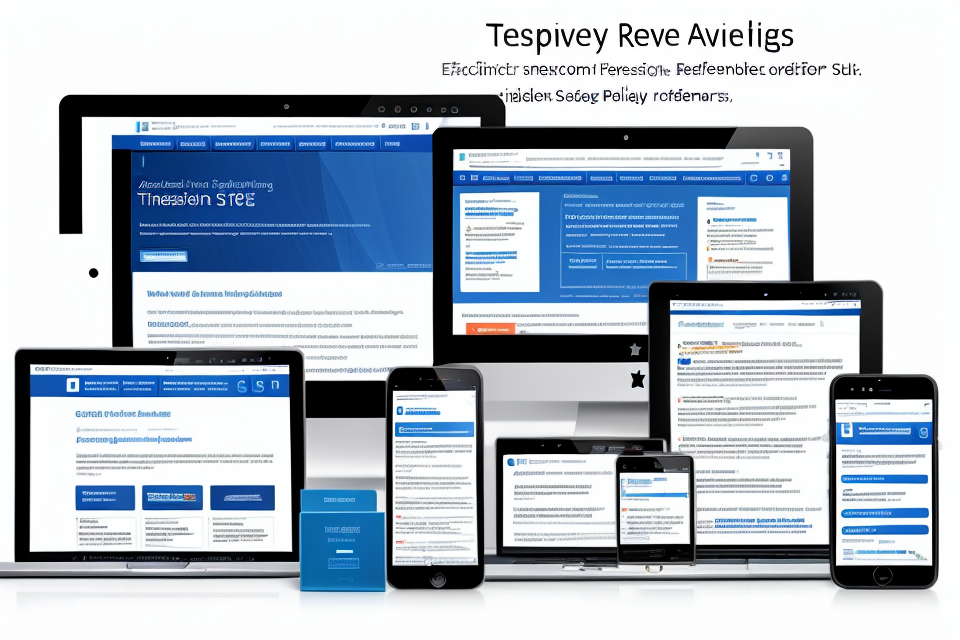Understanding the Tech Review Landscape
When it comes to making informed purchasing decisions, tech reviews play a crucial role in providing insight into the pros and cons of various products. However, navigating the tech review landscape can be challenging due to the various types of reviews available, the prevalence of sponsored and biased reviews, and the rise of fake and misleading reviews.
The Different Types of Tech Reviews
There are several types of tech reviews, each with its own unique purpose and format. Some of the most common types of tech reviews include:
- Product reviews: These reviews focus on specific products and provide an overview of their features, performance, and value.
- News and rumors: These reviews provide updates on the latest tech news and rumors, including product launches, company developments, and industry trends.
- Expert reviews: These reviews are written by industry experts and provide in-depth analysis and insight into various tech products and trends.
- User reviews: These reviews are written by actual users of a product and provide a firsthand account of their experiences and opinions.
The Impact of Sponsored and Biased Reviews
While many tech reviews are unbiased and provide honest and accurate information, others may be sponsored or biased. Sponsored reviews are those that are paid for by the manufacturer or vendor of a product, and may be less objective than reviews written by independent sources. Biased reviews, on the other hand, may be influenced by personal opinions or agendas, and may not provide a fair or accurate assessment of a product.
It is important to be aware of sponsored and biased reviews when evaluating tech reviews, as they may not always provide the most reliable or trustworthy information.
The Rise of Fake and Misleading Reviews
Unfortunately, the tech review landscape is also plagued by the rise of fake and misleading reviews. These reviews may be written by individuals or organizations with a vested interest in promoting a particular product or brand, or may be generated by automated systems designed to manipulate search engine rankings and user opinions.
Fake and misleading reviews can be difficult to identify, but it is important to be aware of their potential presence when evaluating tech reviews.
Overall, understanding the tech review landscape is crucial for making informed purchasing decisions. By being aware of the different types of reviews, the potential for sponsored and biased reviews, and the rise of fake and misleading reviews, you can better evaluate the reliability and trustworthiness of the information provided in tech reviews.
The Benefits of Reliable Tech Reviews
Reliable tech reviews are essential for consumers looking to make informed purchasing decisions. With so many products on the market, it can be challenging to determine which one is the best fit for your needs. That’s where reliable tech reviews come in. By providing honest and unbiased opinions, these reviews can help you make a more informed decision and avoid costly mistakes.
Here are some of the benefits of reliable tech reviews:
- Saves time and effort: Reading through multiple reviews can be time-consuming and tiring. With reliable tech reviews, you can save time and effort by getting a concise and accurate summary of the product’s pros and cons.
- Provides unbiased opinions: Reliable tech reviews are written by experts who have no vested interest in the product. This means that you can trust the opinions presented in the review, as they are not influenced by any personal bias or financial incentives.
- Helps you avoid poor quality products: Reliable tech reviews can help you avoid purchasing poor quality products. By providing honest opinions about a product’s strengths and weaknesses, you can make a more informed decision and avoid purchasing a product that does not meet your needs.
- Builds trust with consumers: Reliable tech reviews play an essential role in building trust with consumers. When a brand provides reliable and honest reviews, it shows that they are committed to transparency and honesty, which can help build trust with their customers.
Overall, reliable tech reviews are a valuable resource for consumers looking to make informed purchasing decisions. By providing honest and unbiased opinions, these reviews can help you avoid costly mistakes and find the best products for your needs.
The Problem with Finding Reliable Tech Reviews
In today’s digital age, technology has become an integral part of our lives, and with the abundance of products available in the market, it can be challenging to determine which ones are worth investing in. With the rise of online reviews, consumers have access to a wealth of information, but finding reliable tech reviews can be a daunting task. The difficulties in identifying credible sources of tech reviews and the challenges of separating sponsored and biased reviews from genuine ones can make the process of selecting the right product a time-consuming and overwhelming experience.
In today’s world, technology plays a crucial role in our lives. From smartphones to laptops, gadgets are an integral part of our daily routine. But, how do we decide which gadget to buy? The answer is simple – by reading tech reviews. However, with the internet being flooded with countless reviews, finding a reliable source can be a daunting task. But, fear not! This guide will provide you with a comprehensive list of websites and platforms where you can find trustworthy and informative tech reviews. So, let’s dive in and explore the world of tech reviews!
Popular Platforms for Tech Reviews
Major Tech Review Websites
When it comes to finding reliable tech reviews, major tech review websites are a great place to start. These websites have a large audience and are known for providing in-depth, unbiased reviews of the latest technology products. Some of the most popular major tech review websites include:
- CNET: CNET is a well-known technology website that offers reviews of a wide range of products, including smartphones, laptops, and home appliances. The website also features news and updates on the latest technology trends.
- TechRadar: TechRadar is a UK-based technology website that provides reviews of the latest tech products, as well as buying guides and comparisons. The website also offers news and opinion pieces on the latest technology developments.
- PCMag: PCMag is a technology website that offers reviews of a wide range of products, including computers, smartphones, and tablets. The website also provides news and analysis on the latest technology trends.
- Tom’s Guide: Tom’s Guide is a technology website that provides reviews of the latest tech products, as well as buying guides and comparisons. The website also offers news and opinion pieces on the latest technology developments.
- TechSpot: TechSpot is a technology website that offers reviews of a wide range of products, including computers, smartphones, and gaming consoles. The website also provides news and analysis on the latest technology trends.
When using major tech review websites, it’s important to be aware of potential bias and conflicts of interest. Some websites may receive funding from manufacturers or advertisers, which could influence the reviews they publish. To ensure that you’re reading unbiased reviews, it’s important to do your own research and read reviews from multiple sources.
Social Media and Blogs
The rise of social media and blogs as sources of tech reviews
In recent years, social media platforms and blogs have become increasingly popular sources for tech reviews. These platforms offer a wide range of reviews, from in-depth analysis to quick impressions, making them easily accessible for users seeking information about new products. However, with the influx of user-generated content, it can be challenging to determine the credibility of the reviews.
How to evaluate the credibility of reviews on social media and blogs
To ensure that the reviews you are reading are credible, consider the following factors:
- Authority: Check the author’s background and experience in the tech industry. A reviewer with a strong background in technology or a proven track record of providing accurate reviews is more likely to provide a reliable assessment.
- Reputation: Consider the reputation of the blog or social media platform where the review is posted. Reputable sources are more likely to fact-check and verify the information provided by their contributors.
- Objectivity: Evaluate the reviewer’s stance on the product being reviewed. If the reviewer has a clear conflict of interest or a history of favoring certain brands, their review may not be entirely reliable.
- Consistency: Look for consistency in the reviewer’s opinions and reviews. If the reviewer’s opinions are often extreme or contradictory, it may be a sign that their reviews are not credible.
- Expertise: Check if the reviewer has any expertise in the specific field of the product being reviewed. A reviewer with relevant experience or knowledge is more likely to provide an accurate assessment.
By carefully evaluating these factors, you can make informed decisions about the reliability of the tech reviews you read on social media and blogs.
Online Retailer Reviews
The benefits and drawbacks of reading reviews on online retailer websites
- Gain insights into the customer’s experiences and feedback about a product
- Learn about the product’s pros and cons from a user’s perspective
- Compare different products and brands within the same category
How to identify fake and misleading reviews on online retailer websites
- Check for overly positive or negative reviews that seem unrealistic
- Look for reviews with generic or copied content
- Investigate reviews with no history of previous purchases or low-quality content
- Consider the reviewer’s purchase history and ratings for other products
Alternative Sources for Tech Reviews
Professional Reviews and Testing
Professional reviews and testing can be a valuable source of information when it comes to researching and evaluating technology products. These reviews are typically written by experts who have extensive knowledge and experience in the field, and they provide detailed analysis and evaluation of the product’s features, performance, and capabilities.
The benefits of professional reviews and testing include:
- Expert opinion: Professional reviewers have a deep understanding of the technology and can provide a well-informed opinion on the product’s strengths and weaknesses.
- Objective analysis: Professional reviewers conduct thorough testing and analysis of the product, providing an unbiased assessment of its performance and capabilities.
- Comprehensive coverage: Professional reviews often cover a wide range of topics, including design, performance, functionality, and value for money, providing a comprehensive overview of the product.
When looking for reputable professional reviewers and testing organizations, it’s important to consider the following factors:
- Reputation: Look for reviewers and organizations that have a reputation for providing accurate and trustworthy information.
- Expertise: Make sure the reviewer or organization has expertise in the specific area of technology that you’re interested in.
- Independence: Look for reviewers and organizations that are independent and not influenced by any particular manufacturer or vendor.
- Transparency: Check to see if the reviewer or organization discloses any potential conflicts of interest or financial relationships with manufacturers or vendors.
By using professional reviews and testing as a source of information, you can make informed decisions when it comes to purchasing technology products.
User-Generated Reviews
When it comes to finding reliable tech reviews, user-generated reviews can be a valuable source of information. These reviews are written by individuals who have used the product or service and can provide an honest and unbiased opinion. However, it’s important to note that not all user-generated reviews are created equal, and it’s important to evaluate their credibility before relying on them.
The Pros and Cons of User-Generated Reviews
One of the main advantages of user-generated reviews is that they can provide a wealth of information from a variety of perspectives. Users can share their experiences with a product or service, including both positive and negative aspects, which can help others make an informed decision. Additionally, user-generated reviews can be more detailed and personalized than those written by professional reviewers, as they are based on real-world experiences.
However, there are also some potential drawbacks to user-generated reviews. One issue is that some reviews may be fake or written by people with a vested interest in promoting or criticizing a product or service. Additionally, user-generated reviews may not always be as objective as professional reviews, as they can be influenced by personal biases or experiences.
How to Evaluate the Credibility of User-Generated Reviews
To ensure that you are reading reliable user-generated reviews, it’s important to evaluate their credibility. Here are some tips to help you do so:
- Look for reviews from a variety of sources: If a product or service has been reviewed by multiple users, it’s more likely that the reviews are genuine and unbiased.
- Check for red flags: Look out for reviews that seem overly positive or negative, as these may be fake or written by people with a vested interest.
- Consider the reviewer’s expertise: If a review is written by someone who is knowledgeable about the product or service, it may be more reliable than a review written by someone with little experience.
- Check for detail: A detailed review that provides specific examples and evidence is more likely to be reliable than a general review that doesn’t provide much information.
By following these tips, you can ensure that you are reading reliable user-generated reviews and using them to make informed decisions about the products and services you purchase.
Independent Reviews
The digital age has seen a significant rise in independent reviewers and review websites that offer unbiased opinions on various tech products. These independent reviewers and websites have become an alternative source for consumers who are looking for reliable and trustworthy reviews. In this section, we will discuss how to identify trustworthy independent reviewers and websites.
The rise of independent reviewers and review websites
The growth of the internet has provided a platform for independent reviewers and review websites to thrive. These reviewers and websites have carved a niche for themselves by offering honest and unbiased opinions on tech products. They have become a valuable resource for consumers who want to make informed purchasing decisions.
How to identify trustworthy independent reviewers and websites
Identifying trustworthy independent reviewers and websites can be a daunting task, but there are certain factors that can help you distinguish between genuine and fake reviews. Here are some tips to consider:
- Credibility: Look for reviewers and websites that have a solid reputation in the industry. Check their credentials and experience in the field. You can also look for reviews from reputable sources such as magazines, newspapers, and professional organizations.
- Transparency: A trustworthy reviewer or website should disclose any potential conflicts of interest. They should also provide detailed information about the product, including its strengths and weaknesses. Check if the reviewer or website has a privacy policy and terms of use.
- Consistency: Look for consistency in the reviewer’s or website’s reviews. If a reviewer or website consistently provides accurate and detailed reviews, it is likely that they are trustworthy.
- User feedback: Check for user feedback on the reviewer or website. Look for positive feedback from satisfied customers and negative feedback from dissatisfied customers. This can help you gauge the reliability of the reviewer or website.
In conclusion, independent reviewers and review websites can be a valuable source of information for consumers looking for reliable tech reviews. By considering the factors discussed above, you can identify trustworthy independent reviewers and websites that can help you make informed purchasing decisions.
FAQs
1. What are tech reviews?
Tech reviews are evaluations of technology products such as smartphones, laptops, tablets, and other gadgets. They provide an overview of the product’s features, specifications, and performance, as well as the reviewer’s opinion on the product’s pros and cons. Tech reviews are a valuable resource for consumers who are considering purchasing a new device and want to make an informed decision.
2. Why are tech reviews important?
Tech reviews are important because they provide an unbiased opinion on a product, based on the reviewer’s experience and expertise. They help consumers to make a more informed decision about which product to purchase, by providing information on the product’s performance, durability, and value for money. Additionally, tech reviews can also help consumers to avoid purchasing a product that may not meet their needs or expectations.
3. Where can I find tech reviews?
There are several places where you can find tech reviews, including online tech websites, such as CNET, TechCrunch, and The Verge, as well as consumer electronics websites, such as Amazon and Best Buy. Additionally, many tech YouTubers and influencers also provide reviews of the latest technology products. It’s important to read multiple reviews from different sources to get a well-rounded opinion on a product.
4. How can I determine if a tech review is reliable?
To determine if a tech review is reliable, you should look for reviews from reputable sources that have a track record of providing accurate and unbiased information. Additionally, you should also consider the reviewer’s expertise and experience in the field, as well as their qualifications and credentials. It’s also a good idea to read multiple reviews from different sources to get a well-rounded opinion on a product.
5. Can I trust user reviews on websites like Amazon and Best Buy?
User reviews on websites like Amazon and Best Buy can be a helpful resource, but it’s important to take them with a grain of salt. Some user reviews may be biased or inaccurate, so it’s important to read multiple reviews and consider the reviewer’s experience and expertise. Additionally, you should also look for reviews from professional reviewers and experts in the field, as they can provide a more informed and unbiased opinion on a product.



